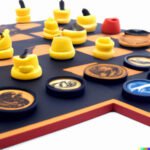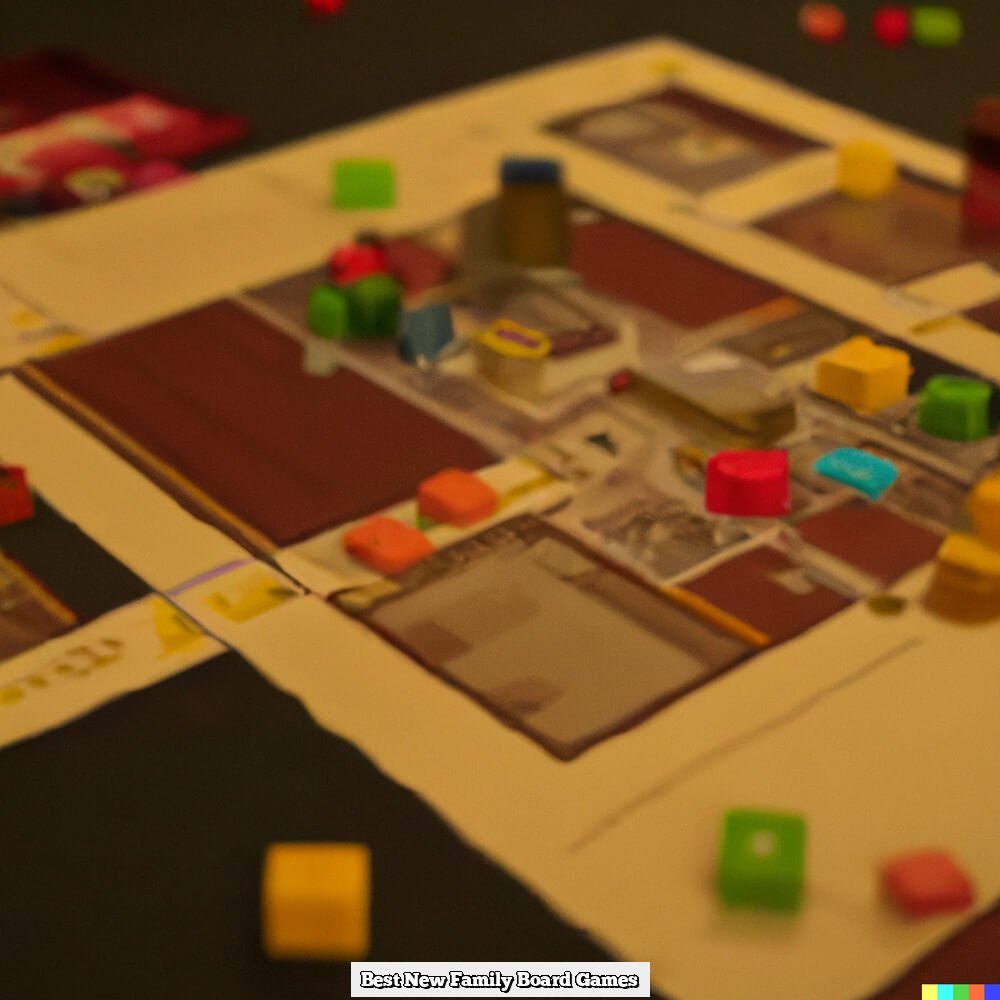
Family board games are a great way for families to bond. They bring people together and provide an opportunity for family members of all ages and interests to be able to enjoy themselves, from young children to grandparents. Not only do these types of activities create cherished moments that will stay with families for years, but they also offer some excellent learning opportunities – introducing young players to strategy, problem-solving, developing communication skills, and, of course, having fun.
Playing different family board games has lots of benefit for everyone in the family. For starters it can help build relationships between the members within the family, developing a strong connection between each other while having a shared external goal in mind which can help create good conversation within the family unit.
Additionally it can help exercise memory and analytical skills, develop strategic thinking while increasing problem solving skills as this could come up during game play. It teaches team work as well when playing against another team or when partners have to work together towards a common goal.
With so many positive benefits there is no shortage of options when deciding what board game you want your family to play. Some popular options these days include classic board games such as Monopoly or Clue; newer favorites like Catan or Ticket To Ride; complex strategy-based card games such as Magic The Gathering or Exploding Kittens; there are trivia based games like Trivial Pursuit and Buzz.
– something for everyone’s taste. By spending quality time playing together, families will get more out of their experiences than just having fun – opening up various topics of discussion amongst one another that further solidify those connections even more.
Family board games truly give every member something they can look forward to doing every week or even every day if you take turns rotating what game you play each time. Plus with so much variety available today there will never be a dull moment in finding something new and interesting to try together as a family Unit.
History of Family Board Games
Family board games have long been a staple entertainer in the home, offering an excellent way to enjoy quality time together. While today’s popular board games reflect modern interests and designs, the traditional structures and game-play of many classic titles remain unchanged throughout generations.
It all began with The Royal Game of Ur (circa 2600 BC) which is largely considered one of the oldest board games known to man. Its aim was to be the first player to remove their pieces from the board and while reflective of its ancient origins, similar characteristics are observed in modern day Snakes & Ladders.
The exact development milestones between The Royal Game of Ur and ‘modern’ family board games is unknown – though it is safe to say that dominoes, checkers, chess & playing cards held significant influence on such titles.
List Of Popular Family Board Games
- Monopoly: originally published by Parker Brothers in 1935, Monopoly remains a beloved board game amongst all ages.
- Scrabble: the word game giant was invented by Alfred Mosher Butts around 1933 – and following its purchase by James Brunot in 1948 has sold more than 150 million copies.
- Battleship: thought to have originated in Russia during WWII, battleship allows two players set up their respective boards with ships without their opponent being able to see where they have placed them.
- Risk: >developed by French film director Albert Lamorisse in 1957, Risk challenged players to compete against each other for world domination.
- Trivial Pursuit: >creaed Robert Foley and Chris Haney almost 40 years ago, Trivial Pursuit tests both general knowledge of participants whilst also rewarding strategic thinking skills.
These are just a few highlights from more than 5 decades worth of iconic titles; which also include Axis & Allies (1981), Clue (1949), Ticket To Ride (2004) Pandemic (2008) etc It has surely been an incredible journey so far – with surely more exciting innovations still yet to come.
Benefits of Playing Family Board Games
Playing family board games is an excellent way to develop creativity and team spirit. Games like Monopoly, Chess and Scrabble are not only a source of great entertainment but also promote the development of different problem-solving skills. When playing these board games, everyone in the family has to work together in order for them to progress.
Each person’s successes and failures affects the whole team. This encourages everybody to be creative in their approach while strategizing. Family members will have to brainstorm on ways that can help them reach their goal faster than their opponent.
During this process of discussion, they come up with different strategies which boost their creativity level as well as open up new opportunities that were not seen before. Board games don’t just end here; they also provide lessons on basic math skills and foster good sportsmanship during heated game moments.
Board games aren’t limited to just traditional table games like Monopoly or Chess, but there is wide variety available online too which can be played by all ages in the family. They are a great way for families to bond and also allow members from all age groups to interact more openly with each other.
When playing board games you can learn more about the people around you and cultivate empathy while understanding the differences between your strengths and weaknesses along with others in the family group setting.
Regardless of whatever game you play, it always promotes fun conversation between each member while also providing information about history or culture when appropriate within certain scenarios of particular gaming interests hence broadening everyone’s knowledge base one turn at a time.
Creative Uses of Family Board Games
Playing board games is widely accepted as a healthy, evolutionary activity that can bring families together. Board games have seen a massive surge in popularity over the last decade, further indicating the importance of family game nights in promoting warmth and connection between loved ones. As such, there are countless ways to get creative with family board games and create additional activities based on board game play.
Team Play Rules
One great way to expand upon traditional family board game play is by opting for team play. This option can help younger players learn more complex rules quicker and allow everyone an opportunity to contribute to the overall team success. Rather than competing individually against each other, they could learn how to work together cooperatively as a team to achieve victory. Games like “Scrabble” or “charades” could be significantly improved with team-play variation rulesets.
Adding Puzzles
Puzzles are another excellent way of expanding the scope of classic board game play. For instance it’s possible to add crossword or word search puzzles into monopoly rounds or create simple math problems for tokens to solve in order to advance around the board quickly.
It is also easy to employ “treasure hunts” where scattered pieces must be gathered from diverse locations throughout the house in order for a complete picture or object to become visible once all components are collected-kindly making utilize of old card decks and miscellaneous trinkets found everywhere.
Android & Online Variants
With the tremendous advancements in technology over recent years unsurprisingly come new playing options that incorporate modern tech devices like consoles, tablets and smartphones. Classic titles now also exist across multiple platforms such as “Monopoly Slots” which allow virtual players experience some of their favorite leisure activities all within one single interface. As such, online players are now able pitch against each other without having ever met before while engaging in multi-player tournaments from any corner of the globe.
Popular Family Board Games
1. Monopoly: This classic has been passed down through generations. It requires strategy and encourages players to think ahead of their opponents. It appeals to people of all ages as each family member can compete fairly. The playing pieces, board and objective makes it a timeless classic that brings families together to laugh, strategize and even occasionally argue.
2. Scrabble: Often thought of more as an adult game, Scrabble packs some serious brain power and tests both the spelling and vocabulary knowledge of all its players. Players try to make words on the board using letters with different point values while blocking their opponents from forming words or stealing tiles from other players’ racks for a higher score.
3. Clue: Clue is a great introduction to detective work. Based on the popular murder mystery novels by Agatha Christie, this game requires deduction and skill in order to solve the mystery before time runs out; racing against your opponents can be quite challenging. Clue promotes problem-solving practices, enhances critical thinking skills and stimulates communication among family members as pieces become visible throughout the game.
4. Life: A game where each player takes turns spinning a wheel making decisions about life events such as getting married, having children or buying property with each player ultimately going towards retirement age – this game offers education value when it comes to money management and investments. Life also allows players to find balance between real life scenarios regardless of age group; whether it’s looking after younger generations or buying property before retiring.
5. Trivial Pursuit: One of the most popular games that actively engages everyone in its diverse range of content questions ranging from entertainment, science, history encouraging multiple generations not only test their existing knowledge but also discover and foster new ones along the way.
Tips and Tricks for Getting your Family to Play
Paragraph 1: Board games can be a fun way to engage with each other and get the whole family to bond. It gives us an opportunity to gain a better understanding of each other by discussing strategies, learning about each other’s interests and preferences, and giving us time to converse with one another in an atmosphere of playfulness and laughter.
As parents, it is important that we encourage our children to participate in different activities like board games, as this kind of activity strengthens bonds within the family.
Paragraph 2: If you are looking for ways to get your family excited about board games there are some great tips on how to do so. Start off by choosing games that are age-appropriate for everyone involved.
This will make sure that kids as well as adults can participate in the game without feeling overwhelmed or outmatched. You can also start introducing smaller, simpler family board games such as Hangman or Snakes & Ladders which just involve rolling dice and getting everyone together for some fun.
Paragraph 3: If you have older kids and teenagers who are more technologically savvy you could introduce apps such as Words with Friends or Chess Trainer which can allow them to practice their strategic skills online. In addition, there are plenty of educational resources available online such as websites offering free math worksheets designed specifically for younger learners that rely heavily on wordplay and puzzles that often come along with board games.
- Choose age-appropriate board games.
- Introduce simpler family board games.
- Try incorporating apps liked Words with Friends.
- Utilize educational resources found online.
Incorporating Lessons into Family Board Games
Family board games offer a unique opportunity to socially engage with family members, foster communication skills, and learn important lessons in an entertaining way. Instead of traditional teaching methods such as lecturing or rote memory tests, adopt a game-based spirit that encourages critical thinking, problem solving, and collaboration. Here are some fun ways to transform family game nights into learning experiences.
One way to incorporate lessons into your family board games is to select ones social studies related. As you play, the educational elements can be used to explain things like cultures in different countries or governmental systems around the world.
Through these types of games parents can provide students with visual complements that bring these topics to life in engaging ways. By understanding how problems are solved while playing together this is a great learning technique for children who benefit from hands-on activities.
An exciting way to review basic math skills during game night is through games like Monopoly or Qwirkle where players have to calculate money balances and make strategic moves based on resources available. Likewise Scrabble requires rudimentary math skills like alphabetizing words and adding up letter point values quickly when making word choices which can be further enhanced by competing against each other for higher scores.
Many areas of science can also be explored while playing classics such as Sorry. or Chess as students learn about angles, motion and the effects of gravity on objects being moved across the board within each turn taken.
In addition to helping students gain an increased knowledge base, family board games can also teach valuable life lessons about patience, fairness, honesty and even resilience when it comes time for them to accept defeat gracefully without becoming overly upset or emotional about it.
These experiences will give kids a better understanding of the consequences that come from making decisions with little thought put into them before acting upon them which will help them later on in life become more conscious thinkers with their actions.
Resources
Family board games can bring the whole family together for hours of fun and laughter. Many of these classic board games have been around for generations and are easy to learn, but they’re far from boring. With so many new board game editions on the market, parents and children often don’t know where to start while looking for a suitable game. Fortunately, there are plenty of resources available for discovering new and exciting family board games.
Retail Stores
Retail stores are one of the most common and easiest places to find a variety of board games for the whole family. Whether it’s an independent toy shop or a large retail outlet like Walmart or Target, stores usually carry a selection of both traditional and modern-day board games.
From classics like Monopoly, Scrabble, Clue, Checkers and Chess to popular favorites such as Catan, Pandemic, Betrayal at House on the Hill and Splendor; you can find something that suits your family’s interest level and age range.
Online Resources
The internet is filled with online resources for finding new family board games. Websites such as Board Game Geek have comprehensive lists of recommended titles sorted by age group and difficulty level that can be used by parents seeking advice about what type of game best suits their needs.
Additionally, bloggers who write reviews about recently released titles offer valuable insight into what makes certain games more enjoyable than others. Social networks like Twitter also provide an excellent platform to ask questions about any specific game or genre before making a purchase decision.
Friends & Family Recommendations
Parents should also consider asking friends or extended family members who might be able to give them insider knowledge on some great titles they might not have heard about yet. Friends who already own similar style games could recommend options that their kids absolutely love playing as well which can further narrow down their search significantly.
Furthermore, parents may find it beneficial to attend local swap meets or flea markets as there’s usually a lot of vintage gems hidden in these places amongst other secondhand items waiting to be discovered by someone with an eye open ready enough.
Conclusion
Family board games offer a great way to have fun together while engaging in some healthy competition. They can often be used as an enjoyable way of spending time with family members and friends. While there are so many board games on the market, playing them can provide benefits like increased social and cognitive skills, collaboration, problem-solving experience, creativity, and even emotional support.
Additionally, playing these games strengthens family bonds by allowing parents to interact positively with their children away from the pressures of daily life. For example, sitting down to play a game like Clue or Monopoly is a great way to strengthen ties with back-and-forth communication and positive reinforcement. As this communication strengthens relationships between parents and children it creates new memories that can last a lifetime.
For families who don’t normally play board games and want to start incorporating them into their routine, they can do so in a variety of ways. Hosting game nights at home with the whole family partners fun activities with education on how to play the game that’s being chosen as well as introducing strategies on how each person should approach it.
Game stores also offer weekly tournaments which also provide an opportunity for families to have fun together while learning more about each other in an entertaining environment. Parents can also purchase board games designed for multiple age ranges which would guarantee entertainment for all family members regardless of age difference within the household.
In conclusion, it’s safe to say that incorporating family board games into your at-home routine is not only incredibly rewarding but also immensely beneficial both socially and emotionally for everyone involved. It provides not just entertainment but an opportunity for growth due to engaging in teamwork activities as well as building crucial communication skills that will be helpful outside of the gaming realm too.




